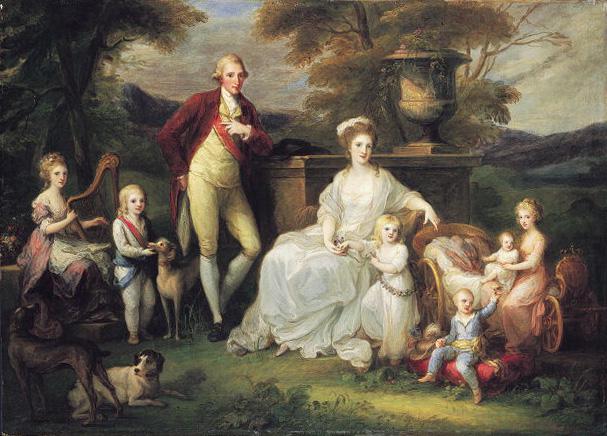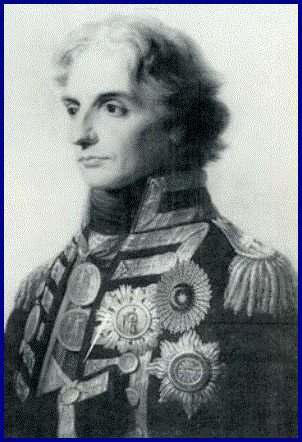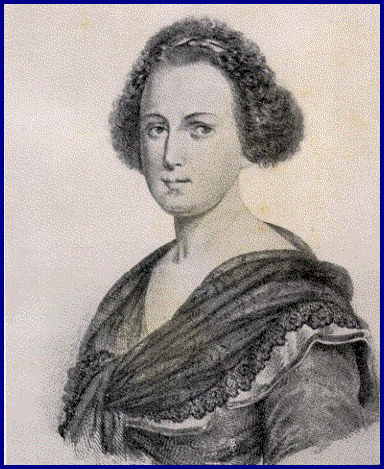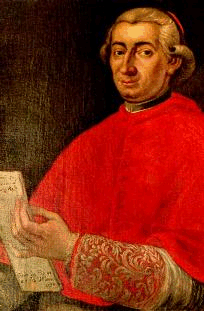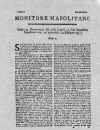
Introduction.
Towards the end of the 18th century an exceptional event happened in Naples: the proclamation of Republic, based on brotherhood and equity. That republican ideal, which was not born suddenly, was repressed with the blood of the patriots. It was one of the most beautiful and interesting pages of the Italian history, unfortunately little famous, but not for this less meaningful and important. All the events and the considerations that will be reported and discussed here, concerning with the beginning and the dissemination of the new "Ideas of the Reason" and the "Illuminism" in Europe and Italy and finishing with the martyrdom of the condemned. Our style is of extreme essentiality. All those who wish more widen deepening's, we suggest to send back to the proofs and publications on the argument. An appropriate section will be dedicated to the collection of the external contribution. An other section will be referred, we hope, the file-cards with the biography of the personages who we will meet in our narration. At last an other section on the works published, such as : historical books, novels, cinematographic and television works will be reported on the argument. The birth of this web-site coincides with the next celebrations of the bicentennial. It is a pure case because these pages will continue to stay and to grow up in the time. We hope that the interest will be always strong and that the memory will be always alive. The rush fellows and "the modern managers", who cannot drown within details, will find forwards one synthesis of the main events, hoping to provoke in them interest and passion for this Neapolitan history so painful, but also so rich of Gloria.
Synthesis
of the events.
On 14th July of 1789 with the taken of the Bastille begins the French Revolution. The fear that the danger revolutionary can be disseminated also in the reign of Naples attacks Ferdinand IV, his wife Carolina Maria, sister of Maria Antonietta (that one of the brioches), and the all Court and provoke to the passage from one political of cautious reforming policy to a political strongly repression and conservationism. The position of first minister is given to the English John Acton who enjoys particular favours of the Queen and, in order to avoid the dissemination of the revolutionary ideas, it is decided to send away all the French citizens; it is instituted a special Committee of State for enquiring suspects and it is encouraged and rewarded the secret informers.
Queen Maria Carolina d' Asburgo.
On 22nd September of the 1792 French national Convention proclaims the Republic.
A month after the citizen Armand Luis Mackau, asks with a letter, the official
recognition of the new republic and his accrediting to the Neapolitan court.
Maria Carolina and Acton are categorical: no recognition. A true diplomatic
incident occurs and Paris sends part of the fleet. Fifteen boat vessels
commanded from the citizen La Touche-Treville reach Naples on 15th December
in order to ask reasons for the lacked recognitions. The court has fear,
it hesitates, and at last it yields also because Acton is convinced that
Naples is full of republicans ready to rise. In truth the French shipment
does not obtain only the recognition of the republic and its ambassador,
but it allows to La Touche to establish the first relationships with the
Neapolitan patriots.
|
Angelic Kauffmann, Portrait of the Real Family of Naples. The figure
to the centre, sitting, is Maria Carolina. To her left, in feet, Ferdinand
IV On
21st January of 1793, in Paris, Luigi XVI is guillotined and in Naples
there are the first arrests, four cats nearly all released then for
not guilt. " When it was known to Naples, in the second half
of October (1793), of the decapitation of the Queen of France, the
balance emotional of Carolina Maria had a definitive collapse"
(A. Coletti: The Queen of Naples); and on an image with her sister
and the spouse she marks: "I swear to revenge me until the tomb".
The reaction is sharpened. Meanwhile the patriotic society by little
constituted by Carl Lauberg is cracked in two: one supporting of a
constitutional monarchy (LOMO = Libertà o morte) and an other
supporting of a democratic Republic (ROMO = Repubblica o morte). The
" Declaration of the rights of the men and of the citizens "
proclaimed in France, inflames the hearts of some Neapolitans and
someone dreams the revolution. |
|
The
imprisoned are 53, charged of crime against the Religion, the Monarchy
and the State." It wanted the blood, and it had some " will
write the Cuoco, and in fact there will be three sentences of death,
48 between of confine and exile and 2 acquittals.It collapses therefore
every possibility of dialogue between reformers and monarchy. In Naples
now reigns the fear. Enough a spied on, a unfounded accusation, dictated
also from old personal rancour's or quite from the convincement to
make a license of fidelity to the King, in order to send an innocent
in chains. It is considered crime to read or to possess newspapers,
books and publications coming from France, so that it is crime to
wear clothes which can inspire to the French Republic. The arrests
increase, the jails are filled up hitting the part more cultured and
prepared of the Neapolitan Nation and also a part of the nobility
near the court. In the February of 1796 is arrested Mario Pagano.
On the military forehead, the reign of Naples, that had joined to
the antiFrench coalition, although an army of 30,000 men and its valiant
behaviour, take heavy failures; on the 5th June of 1796 is underwrite
to Brescia, between the general Napoleone and the Neapolitan representative,
an armistice subsequently ratified with the treaty of peace of Paris.
Gotten rid of the Neapolitans, Napoleon has good hand against the
Austrians spreading in Italy and favouring the birth of republics
inspired to the French constitution. On 6th July 1797 is proclaimed
the Liguria Republic the day after the Cisalpina Republic and on 15th
February of the 1798 Republic Roman. |
|
|
|
Ferdinand
in spite of the peace of Paris comes to an agreement, secretly to
his mind, on 19th May 1798 with Austria. Moreover, spurred from his
wife Carolina and the from the English ambassador's wife, Emma Hamilton,
a former London masseuse, he grants support to the English fleet in
the port of Syracuse. This aid allows admiral Horatio Nelson, head
of the English fleet, to defeat the French fleet in the famous and
decisive battle of Abukir on 1st August of 1798. To the French protests
he will answer getting aids obligation coming up from the marine right
and in order to demonstrate distension towards the French the second
process to the Neapolitan "giacobini" is concluded with
many releases. On 5th October the 1798 during a perquisition of the
house of Eleonora Pimentel De Fonseca, copies of the Encyclopédie
of Denis Diderot are found; for this crime the Pimentel is arrested
and translated in the jail of the Vicaria. |
|
On
9th October 1798 arrives from Austria a valiant captain, general Karl
von Mack, the war to France is decided and, on 23rd of the same month,
the borbon army, solid of 70,000 men, invades the Republic Roman,
and on the 29th Ferdinand IV enters in Rome. But a decisive and immediate
French counter-offensive forces Mack to order the withdrawal. Ferdinand
escapes shameless, and, people say, he change his dresses with those
of the duke of Ascoli. He returns to Naples and, fearing to make the
same end of his brother-in-law Luigi, he decides to abandon everyone
and everything. On 21st December he escapes to Palermo embarking himself
on the Vanguard of Nelson with all the family and John Acton. But
he does not forget, in spite of the haste, all the money stocked in
the city banks and the treasures of art prepared from the Acton and
English ambassador Sir Hamilton and entrusts prince Francesco Pignatelli
with the assignment to represent it. |
|
There
are 30 days of absolute anarchy. The Eletti claim their right to represent
the King, Pignatelli orders the destruction of all the fleet and while
they litigate with among several reselutions (new dynasty, aristocratic
Republic...), the Pignatelli on 12th January of 1799 in Sparanise
concludes a heavy surrender with French general Championnet.The agreement,
that had to remain secret is soon revealed, probably on purpose, and
the people rebel and become uncontrollable; attacks the fortresses,
get hold of the arms and free all the prisoners; among these the De
Fonseca. Pignatelli escapes to Palermo, but Acton imprisons him with
the treason accusation: he could not escape; he isn't at all the King!!
Between the 15th and 22nd January Naples remains in the violence,
are attacked, plundered and destroyed the houses and granaries; the
crowd, guided from two unexpected mob-leaders, Michele Marino said
o' pazz and Pebbe Paggio, complete actions of wickedness and atrocious
barbarism. |
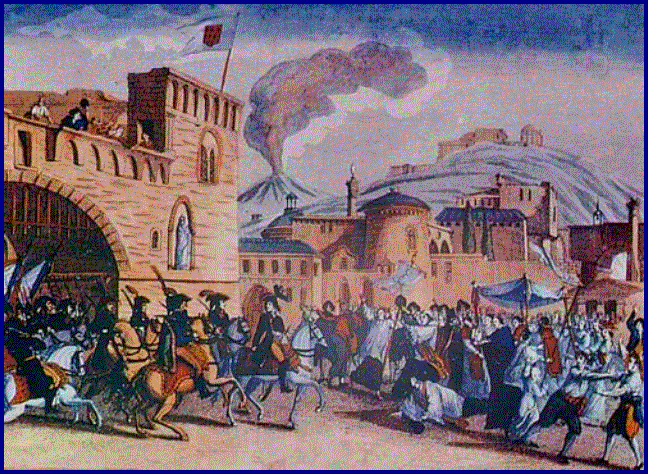
Entrance of the French in NAPLES
|
On
the other side of the real motivations which incite people to pour
for the roads and which certainly we will deepen later on, the Neapolitans
oppose a courageous and heroic resistance to the entrance of the French
troops in Naples. But the republicans not idle, on the night between
the 19th and 20th January introduce themselves in the fortress of
Sant' Elmo and on 21st January they declare decayed the King and proclaim
the Neapolitan Republic raising the red yellow and turquoise flag.
On 23rd Championnet, after hard fights, enters in the city, recognizes
independent the Neapolitan republic and decrees for a temporary government
supported from the French troops. Obtained the approval of the Championnet
(23-24 January), is created a temporary government of twenty members,
then carried to twenty five, among these Carl Lauberg (who is the
first president), the Ciaia (become president to end of February),
M. Delfico, M. Pagano. The government is articulated in six Committees
(Centre Military, Legislation, General Police, Finance, Inner Administration),
the Committees form legislative Assembly and exercise the executive
power in attended of the definitive organization of the government.
On 2nd February is published the first number of the Neapolitan Monitor,
official newspaper of the temporary government. Eleonora Pimentel
Fonseca directs it, one marquise of Portuguese origins very famous
in European literary environment and, for the past, near the court
set. Thanks to the freedom of press with the Monitor many other sheets
are published, but their fortune will not be large also to cause of
the disseminated illiteracy; approximately 90 % in city, in province
nearly the totality. The beginnings of the Republic are difficult,
because subordinate in practical to the dictatorship of the commander
of the French troops, even if the benevolent Championnet maintains
an position of benevolence with the temporary government (he removes
the commissioner of the direttorio Faipoult, too much strict). The
first temporary government issues a single important law, that one
for the abolition of the "fedecommessi" and the "primogenitures"
(29 January 1799), while the law for the abolition of the feudality
cannot go for the moment in port. On 14th April a new French commissioner,
A. J. Abrial (arrived on 28th March in substitution of the Faipoult),
operates a reform of the government of the Partenopean republic that
approves on 25th the law of aversions to the feudality, on the base
of relatively radical criteria, which will not be able to have not
even a principle of performance in consequence of the final events.
Is not succeeded instead approving of the plan of constitution prepared
from the previous legislative commission (Due above all to M. Pagano).
While in Naples this lively activity of government is developed, in
the provinces - where also the Republic had been received favourably
from the medium class - the situation is precipitating. Cardinal Fabrizio
Ruffo, disembarked with the regal assent on 7th February in Calabria
with little companions, using hatred of the peasants masses against
the owners, identified in giacobini highly summarily, succeeds to
get hold quickly of the region advancing then in the Basilicata and
the Puglie. |
|
|
Subsequently,
in April, the news of the defeats endured from the French troops in
Lombardy in the war against the Austrians forces the French to abandon
the Puglie and little after all the reign. The republicans then must
defend themselves alone against the preponderant forces of Cardinal
Ruffo advancing against Naples, which is invested on 13th of June.
After a hopeless resistance to the bridge of the Maddalena and then
in the castles of the city, the patriots who escaped to the massacres
operated from the sanfedist bands and from " lazzaroni "
rebelled, obtain an honourable capitulation (19-23 June), offered
from Ruffo but not accepted from H. Nelson (who had supported with
English naval forces the Borbons) and declared then decayed on 8th
July from the king as soon as he arrived to Naples. Execution of the
Neapolitan' patriots has therefore beginning, they are judged from
the committees of State named from Ferdinand IV; more than one hundred
republicans are hangs or beheads, and among these the beautifulst
names of the Neapolitan intellectuality (Francesco Mario Pagano, Eleonera
Pimentel Fonseca, Ignazio Ciaia, Domenico Cirillo, Russo Vincenzio,
who had had a role also in the Republic Roman) and the Admiral Francesco
Carracciolo for whom Horatio Nelson longs a particular hatred. |
Il Cardinale Fabrizio
Ruffo |
|
Leggi il
MONITORE NAPOLETANO Il giornale
della Repubblica diretto da |

